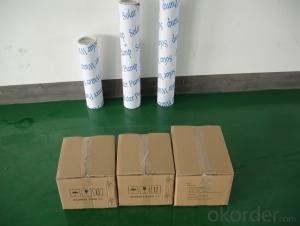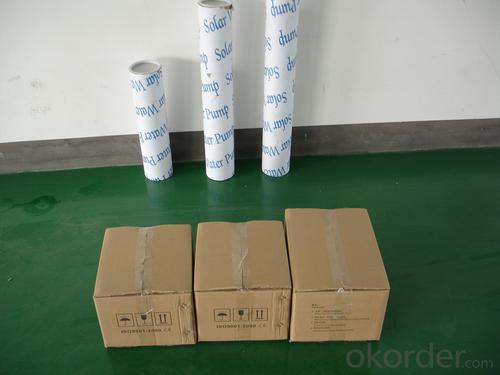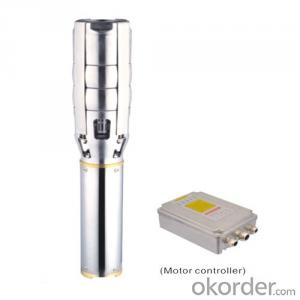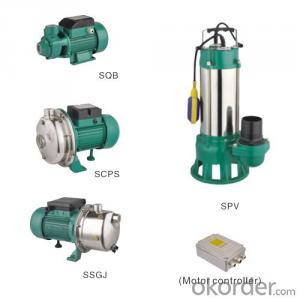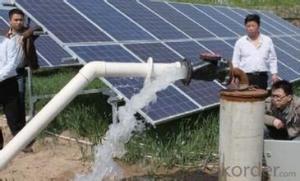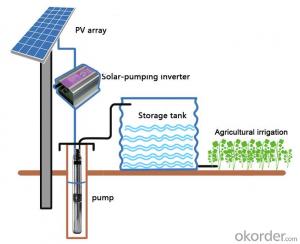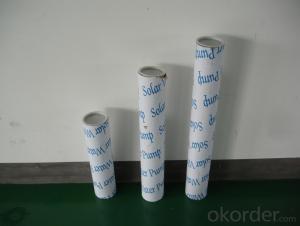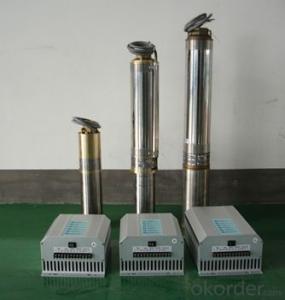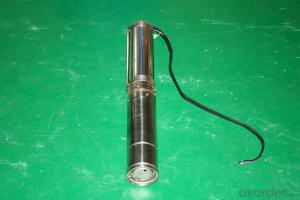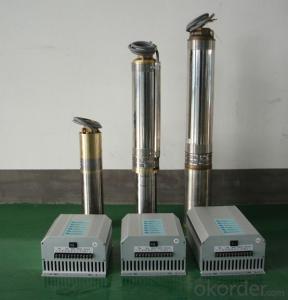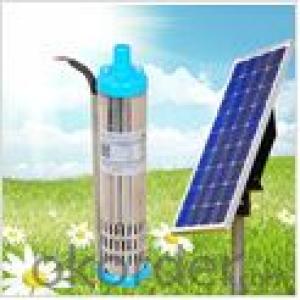Inline Solar DC Submersible Water Pumps
- Loading Port:
- China Main Port
- Payment Terms:
- TT OR LC
- Min Order Qty:
- -
- Supply Capability:
- -
OKorder Service Pledge
OKorder Financial Service
You Might Also Like
Item Description :
This superb new addition to our solar fountain range comes with a 10w solar panel,and a powerful fountain pump that is capable of producing fountains of up to 2m in height. As well as being easy to set up and use.Instruction manual is supplied for assembly and maintenance.
Solar Fountain Key Features :
Powered by direct sunlight
No high voltage electric mains required
Safe for children
Max. height of fountain: 2M
Max. flow capacity: 800 L/H(176 GAL)
10W Polycrystalline solar panel included
18V DC brushless pump
Solar Pump Features :
Can produce fountains up to : 2M (tube height) 1.4M (fountain height)
Comes with multiple nozzle accessories
Cable Length : 5M
Solar Panel Features :
10W peak power.
Polycrystalline highly efficient solar panel
Comes mounted in aluminium frame
Comes with ground stake and rotating knob so you can angle your panel toward the sun
What You Will Get :
10W solar panel
Solar pump
Ground Sake
Nozzle accessories
Precautions :
DO NOT alter or change the product itself or its components
Operate pump in freshwater only, never above 50 degrees celsius
Keep away from flammable liquids
Do not connect to any other power supply other than the included
- Q: Can a solar pump be used for water supply in disaster-stricken areas?
- Yes, a solar pump can be used for water supply in disaster-stricken areas. Solar pumps are an effective and sustainable solution as they rely on solar energy to power the pump and do not require electricity from the grid. This makes them ideal for areas where there may be power outages or limited access to electricity. Additionally, solar pumps are easy to install and maintain, making them a practical choice for emergency situations.
- Q: Can a solar pump be used in areas with limited access to water pumps?
- Yes, a solar pump can be used in areas with limited access to water pumps. The advantage of a solar pump is that it does not require a direct connection to the electrical grid, making it suitable for remote areas. As long as there is sufficient sunlight to power the solar panels, the pump can be utilized to extract water from underground sources or other water bodies, providing a sustainable solution for areas with limited access to traditional water pumps.
- Q: Can a solar pump be used in areas with limited access to water flow meters?
- Yes, a solar pump can still be used in areas with limited access to water flow meters. While water flow meters are useful for measuring the volume of water being pumped, they are not essential for the functioning of a solar pump. Solar pumps can be designed to operate based on the available sunlight and automatically adjust their pumping speed or pressure accordingly. The absence of water flow meters may limit precise measurement and monitoring of water usage, but it does not prevent the use of a solar pump in areas with limited access to flow meters.
- Q: Can a solar pump be used for water supply in parks and gardens?
- Yes, a solar pump can be used for water supply in parks and gardens. Solar pumps are a sustainable and energy-efficient solution that can harness the power of the sun to provide water for irrigation and other purposes in outdoor spaces. They are an excellent option for parks and gardens as they eliminate the need for electricity or fuel, reducing operating costs and environmental impact.
- Q: How does the size of the water reservoir affect the performance of a solar pump?
- The size of the water reservoir does not directly affect the performance of a solar pump. However, a larger reservoir can provide a higher volume of water for the pump to draw from, resulting in a longer running time and potentially better overall performance.
- Q: What is the typical power consumption of a solar pump?
- The typical power consumption of a solar pump depends on various factors, such as the size and efficiency of the pump, the amount of sunlight available, and the desired flow rate. However, on average, a small solar pump can consume around 100 to 500 watts, while larger pumps may require several kilowatts of power.
- Q: What is the lifespan of the solar panels used in a solar pump system?
- The lifespan of solar panels used in a solar pump system can vary depending on various factors such as the quality of the panels, their maintenance, and the environmental conditions they are subjected to. Generally, high-quality solar panels can have a lifespan of around 25 to 30 years. However, regular maintenance and proper care can help extend their lifespan even further.
- Q: What is the cost of installing a solar pump system?
- The cost of installing a solar pump system can vary depending on various factors such as the size of the system, the location, and any additional requirements. On average, the cost can range from $5,000 to $20,000, including the equipment, installation, and necessary permits.
- Q: Can solar pumps be used for water supply in remote agricultural or farming communities?
- Yes, solar pumps can definitely be used for water supply in remote agricultural or farming communities. Solar pumps are a sustainable and cost-effective solution for accessing water in areas where grid electricity is unavailable or unreliable. They can operate using solar energy, which is abundant in most remote locations. Solar pumps are low-maintenance, easy to install, and can provide a reliable source of water for irrigation, livestock, and other agricultural needs in these communities.
- Q: How does the efficiency of a solar pump compare to traditional electric pumps?
- The efficiency of a solar pump is generally higher than that of traditional electric pumps. Solar pumps utilize energy from the sun, which is a renewable source, making them more environmentally friendly. Additionally, solar pumps operate with direct current (DC) power, which eliminates the need for converting electricity from alternating current (AC) as traditional electric pumps do. This results in lower energy losses and higher efficiency for solar pumps.
Send your message to us
Inline Solar DC Submersible Water Pumps
- Loading Port:
- China Main Port
- Payment Terms:
- TT OR LC
- Min Order Qty:
- -
- Supply Capability:
- -
OKorder Service Pledge
OKorder Financial Service
Similar products
Hot products
Hot Searches
Related keywords
